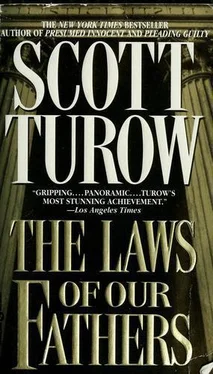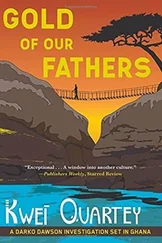Scott Turow - The Laws of our Fathers
Здесь есть возможность читать онлайн «Scott Turow - The Laws of our Fathers» весь текст электронной книги совершенно бесплатно (целиком полную версию без сокращений). В некоторых случаях можно слушать аудио, скачать через торрент в формате fb2 и присутствует краткое содержание. Жанр: Криминальный детектив, на английском языке. Описание произведения, (предисловие) а так же отзывы посетителей доступны на портале библиотеки ЛибКат.
- Название:The Laws of our Fathers
- Автор:
- Жанр:
- Год:неизвестен
- ISBN:нет данных
- Рейтинг книги:5 / 5. Голосов: 1
-
Избранное:Добавить в избранное
- Отзывы:
-
Ваша оценка:
- 100
- 1
- 2
- 3
- 4
- 5
The Laws of our Fathers: краткое содержание, описание и аннотация
Предлагаем к чтению аннотацию, описание, краткое содержание или предисловие (зависит от того, что написал сам автор книги «The Laws of our Fathers»). Если вы не нашли необходимую информацию о книге — напишите в комментариях, мы постараемся отыскать её.
The Laws of our Fathers — читать онлайн бесплатно полную книгу (весь текст) целиком
Ниже представлен текст книги, разбитый по страницам. Система сохранения места последней прочитанной страницы, позволяет с удобством читать онлайн бесплатно книгу «The Laws of our Fathers», без необходимости каждый раз заново искать на чём Вы остановились. Поставьте закладку, и сможете в любой момент перейти на страницу, на которой закончили чтение.
Интервал:
Закладка:
'Everybody's got a youth, Hobie.'
'Yeah, well listen here, Proust. You stay away from her till I get this all scoped out. I don't care what damn curiosity you got. I don't want to be decidin it's best for Nile that she preside and have you spook her off this case, cause she sees she's gone be holdin class reunion in her courtroom. Time being, you do like me, man, just lay low, till I can figure out what a good lawyer's supposed to.'
'Which is what?'
'How the hell to take advantage of the situation.'
They have come close to the admitting area, where they started. The bolts are disengaged and they progress toward the uncloistered light. The lieutenant makes it a point to greet Hobie on the way back through. The black thing. There's a handshake and a riff about the pizza. Then Hobie and Seth are outside, moving toward the last guard shack and the iron gates, meant, apparently, to repel motorized invasion.
'Proust,' says Hobie again, archly shaking his head to rub it in a little more. 'I'm gone go find you some tea cakes, I swear to God. Help you hold on to all this shit you can't forget.'
'Hey, I held on to you, too, so just lighten up.' It took some doing. They both know that.
'Oh, yes you did!' says Hobie emphatically, and in his grand comical way grabs Seth suddenly and kisses him on the forehead. Then Hobie throws a burly arm about him and pulls Seth along the walk, celebrating the relief of the free air outside the jailhouse. He laughs hugely and repeats himself. 'Oh, yes you did.'
PART TWO
PEOPLE MY AGE ARE HUNG UP ON THE SIXTIES. EVERYBODY knows that and regards it as sort of a problem with us: the generation who won't throw out their bell-bottoms. Whenever something by the Beatles comes on the car radio, my son begins to moan for fear I'm going to sing along. 'But look,' I sometimes want to say, 'all these people said they were going to change things, and things changed: The war. The cruel formalities that disadvantaged minorities or women. People stopped behaving like they'd all been knocked out of the same stamping plant.' These days I say I'm going to stop dropping my underwear on the bathroom floor, and I can't even change that. So naturally I think something special happened in the sixties. Didn't it? Or was it just because I was at that age, between things, when everything was still possible, that time, which in retrospect, doesn't seem to last long?
– MICHAEL FRAIN 'The Survivor's Guide,' September 4, 1992
MANY YEARS AGO, I LIVED WITH A WOMAN WHO LEFT graduate school in Philosophy right after she read a remark of Nietzsche's. He'd said: 'Every great philosophy [is] the personal confession of its originator, a type of involuntary and unaware memoirs.' In light of that observation, I guess my friend decided she was, literally, in the wrong department. Nietzsche – and, as ever, the woman – were brought to mind recently when I went to a gathering in Washington in which some of the DC smarty-pants types, the pundits and pols, were analyzing the primaries and repeating as gospel, the adage Tip O 'Neill used to like to repeat, 'All politics are local.' But to me that saying has always seemed to be off by an order of magnitude. It's Nietzsche who was on the button. I suspect he'd say, 'All politics are personal.' – "The Survivor's Guide, March 20, 1992
DECEMBER 4, 1995
Sonny
My mother was a revolutionary. At least that's what she called herself, although 'visionary' was probably a better word. Guns and bombs and political maneuvering, the cruel mechanics of the war for power, had little hold on her imagination. It was the Utopia beyond that inspired her, the promised land where humankind was free of the maiming effects of a hard, material fate. I stood in awe of her whirlwind energies and, in an act of faith of my own, have always kept her soaring hopes at heart. But she and I were never wholly at peace with one another. She was impulsive, a little bit off-kilter – beyond me, in all senses.
With Zora and our differences in mind, I have arrived at the courthouse late. It has been one of those mornings. Nikki would not dress. She lay down when I said stand up, took off her blouse as soon as I had it buttoned, demanded, for no reason detectable to rational inquiry, to wear blue. And when I finally resorted to scolding, she wept, naturally, clutched my hem, and delivered her familiar entreaty: She does not want to go to school. Not today. She wants to stay home. With me. Oh, the agony of Mondays, of parting, of asking Nikki to believe, against the evidence, that she remains for me the center of the world. Someday, I always promise, it will be as she asks. I'll call Marietta with orders to continue every case. But not, of course, today. Today there is duty and compulsion. Nile Eddgar's trial starts. I must go off to my other world, play dress-up and make-believe. And so I begin the week in familiar torment, telling myself I am not my mother, that I am somehow on the road to conquering what remains of her in me.
For both our sakes, I allowed Nikki to skip the car pool and dropped her at school myself. That left me twenty minutes behind our frantic morning schedule. 'Great thing about this job,' one of the old-timers told me when I was sworn in. 'They can't start without you.' Yet I have always regarded a full courtroom waiting for a missing judge as a token of arrogance. I rush through the back door of the courtroom onto the bench, not quite prepared for the scene that greets me. It feels as if both the lights and the heat have been turned up. Beyond the bulletproof divider, the gallery is thick with court buffs and other citizen-onlookers: sickos, retirees, court watchers, and the thoughtfully curious drawn in primal wonder to the act of murder. Within the well of the room, extra deputies in uniform mill idly at the periphery, while the many reporters crowd the limited space available. The jury box must remain empty, awaiting the prospective venire, which will be summoned shortly. Instead, Annie has created a makeshift press gallery, positioning folding chairs on the near side of the yellowish oak panels of the jury box. The best seats, in the front row, have been occupied by three sketch artists, who have laid their pastels at their feet.
As soon as she catches sight of me, Marietta cries out her 'Hear ye's,' bringing court to order. The room is caught up in the commotion of hundreds of persons shifting to their feet, papers rattling, conversations adjourned in a final buzz. 'People versus Nile Eddgar,,' Marietta cries out, when we all are seated. 'For trial.' To my surprise, my stomach rebounds with the words. Two of the artists begin work immediately, eyes revolving between their pads and me. On the one earlier occasion I saw a rendering of Judge Sonny on T V – during a heated divorce case – I was disturbed by the severe look the artist gave me, my even-featured face grave with shadow. Surely I'm better-looking and lighter-hearted than that?
Meanwhile, the participants stalk slowly toward the oak podium at the focus of the room: Gina Devore from the State Defender's Office, a sprite in Ann Taylor, accompanied by a burly black man who must be the lawyer from D C she said would appear for trial. From the other table advances Tommy Molto, the Homicide supervisor, who has elected to try this case, a rarity for him these days. He too has a companion, Rudy Singh, a slender, inexpressibly beautiful young man with a delicate way and a musical Indian accent, who was assigned to this courtroom only last week to handle more routine matters. Finally, behind all of them, somewhat shyly, stands Nile Eddgar. He is more than six feet, far taller than I remember his father, and looms over both Molto and Gina. When he was last here, for arraignment, his hair was pony-tailed and not especially clean. Since then, he's shaved and had a dramatic haircut too, albeit not a particularly becoming one. He looks as if he simply bargained to let the barber cut off half. Charged up by winter static, his brownish hair Christmas-trees about his ears, resembling some hapless Dutch boy's. Nonetheless, as the resident emblem of authority, I'm pleased Nile has made these concessions to respectability, even if off the bench I'd regard the same gestures as silly or conventional.
Читать дальшеИнтервал:
Закладка:
Похожие книги на «The Laws of our Fathers»
Представляем Вашему вниманию похожие книги на «The Laws of our Fathers» списком для выбора. Мы отобрали схожую по названию и смыслу литературу в надежде предоставить читателям больше вариантов отыскать новые, интересные, ещё непрочитанные произведения.
Обсуждение, отзывы о книге «The Laws of our Fathers» и просто собственные мнения читателей. Оставьте ваши комментарии, напишите, что Вы думаете о произведении, его смысле или главных героях. Укажите что конкретно понравилось, а что нет, и почему Вы так считаете.












